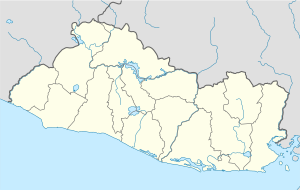Santiago Nonualco
Santiago Nonualco | |
|---|---|
Municipality | |
| Coordinates: 13°31′N 88°57′W / 13.517°N 88.950°W | |
| Country | |
| Department | La Paz |
| Area | |
• Total | 48.46 sq mi (125.51 km2) |
| Elevation | 400 ft (122 m) |
| Population | |
• Total | 37,399 |
| • Ethnicities density | 42/sq mi (16/km2) |
Santiago Nonualco is a municipality in La Paz department of El Salvador.
"Nonualco" means "tribe of mutes" in the native Nahuat language, referring to the Nonoalca people who settled here around 900 CE.[1] There are three "Nonualcos" in the area, the other two are San Juan Nonualco and San Pedro Nonualco.
Santiago Nonualco is a relatively poor community even by Salvadoran standards. The primary historical economic activity has been subsistence farming and the cultivation of sugar cane, providing back-breaking work for those willing to bake in the sun swinging their "corvos," curved tobacco-knife like machetes, for a couple of dollars a day. Currently there are very few employers in the area. Santiago Nonualco has a small central market, a few modest stores (tiendas), diners (comedores), bars, doctor's office, pharmacy, a couple of dentists, a small bank (casa de credito), some lawyers, and not much else. The nearest factories are located near the airport at El Pedregal, about 25 minutes away by bus.[citation needed]
Warrior son
[edit]Santiago Nonualco has one famous native son, one warrior. Anastasio "Indio" Aquino, gained fame leading an uprising against the Spanish in 1832-3. He led his insurgency from a cave located just north of what is now El Salvador International Airport. "La cueva de Indio Aquino" (Indio Aquino's cave) is a little-visited site located in Cerro El Tigre overlooking the Jiboa River and the airport. After a seven-month-long rebellion, Indio Aquino was captured and executed by firing squad in San Vicente.
References
[edit]- ^ According to the Spanish language web site for the municipal government


